TRIPOLI —
Assailants recently invaded Ashraf Abdul Wahab's house while he was away and at gunpoint evicted his wife, two young sons, and 70-year-old mother. The seventh such house in this Tripoli district to have been taken over by petty criminals and drug-dealers, prosecutors say Wahab's is one of more than 100 similar home invasions citywide.
“I feel that Libya gets crushed in a wall because there is no security at the moment," says Wahab, explaining that he has nowhere to turn.
In addition to seeking help from police, the 47-year-old local journalist has even appealed to Prime Minister Ali Zeidan, who this week himself asked Western and Arab allies at a conference in Paris for assistance with the country's deteriorating domestic security.
Struggling to contain a crime wave that is affecting everyday life, Libya's major cities have seen a rash of assassinations, kidnappings and carjackings. From the deputy head of the national Fire Service to the chairman of a major manufacturing company, the capital has been particularly hard hit by the abduction
In a post-Arab Spring Tripoli where insecurity is becoming a part of everyday life, the government has begun to rely on revolutionary militias — the same ones it pledged to disband after the fall of late dictator Moammar Gadhafi — to aid in a crackdown on crime.
But even that isn’t helping. While Zeidan ordered a roundup of the criminals who invaded Ashraf’s house, his family has not yet returned home and no arrests have been made.
“I spoke to Dr. Ali Zeidan himself face to face, alone in his office and I told him my problem," says Wahab. "He responded as I told you, but ... after that everything is as it is.”
Some Sedan’s government is at a loss, forced into a dilemma where crime-fighting militias are themselves contributing to insecurity.
The Nawaz militia, for example, a hardcore Islamist brigade, has been battling drug dealers, and their nightly firefights have been echoing around the capital's Ben Ashour district.
But the Nawasi brigade has also been accused of rounding up gays, and last year its members were involved in the illegal destruction of an historic Sufi mosque.
Abd al-Wahhab Muhammad Qaid, chairman of the parliament’s national security committee, says things will be better when the militias are integrated into the armed forces.
“The interior minister has a very ambitious plan: they plan to absorb all of these people you mention," he says.
But Qaid also urges patience, and says that establishing law and order will take time.
This isn’t music to Ashraf’s ears, who says he would return home but worries about his family.
“I am not afraid to get back, but I am afraid for my family because of the ... weapons around the country, somebody [could] shoot one of my kids or my wife or my mother," he says. "This is my problem now.”
It is also Libya’s problem.
“I feel that Libya gets crushed in a wall because there is no security at the moment," says Wahab, explaining that he has nowhere to turn.
In addition to seeking help from police, the 47-year-old local journalist has even appealed to Prime Minister Ali Zeidan, who this week himself asked Western and Arab allies at a conference in Paris for assistance with the country's deteriorating domestic security.
Struggling to contain a crime wave that is affecting everyday life, Libya's major cities have seen a rash of assassinations, kidnappings and carjackings. From the deputy head of the national Fire Service to the chairman of a major manufacturing company, the capital has been particularly hard hit by the abduction
In a post-Arab Spring Tripoli where insecurity is becoming a part of everyday life, the government has begun to rely on revolutionary militias — the same ones it pledged to disband after the fall of late dictator Moammar Gadhafi — to aid in a crackdown on crime.
But even that isn’t helping. While Zeidan ordered a roundup of the criminals who invaded Ashraf’s house, his family has not yet returned home and no arrests have been made.
“I spoke to Dr. Ali Zeidan himself face to face, alone in his office and I told him my problem," says Wahab. "He responded as I told you, but ... after that everything is as it is.”
Some Sedan’s government is at a loss, forced into a dilemma where crime-fighting militias are themselves contributing to insecurity.
The Nawaz militia, for example, a hardcore Islamist brigade, has been battling drug dealers, and their nightly firefights have been echoing around the capital's Ben Ashour district.
But the Nawasi brigade has also been accused of rounding up gays, and last year its members were involved in the illegal destruction of an historic Sufi mosque.
Abd al-Wahhab Muhammad Qaid, chairman of the parliament’s national security committee, says things will be better when the militias are integrated into the armed forces.
“The interior minister has a very ambitious plan: they plan to absorb all of these people you mention," he says.
But Qaid also urges patience, and says that establishing law and order will take time.
This isn’t music to Ashraf’s ears, who says he would return home but worries about his family.
“I am not afraid to get back, but I am afraid for my family because of the ... weapons around the country, somebody [could] shoot one of my kids or my wife or my mother," he says. "This is my problem now.”
It is also Libya’s problem.




